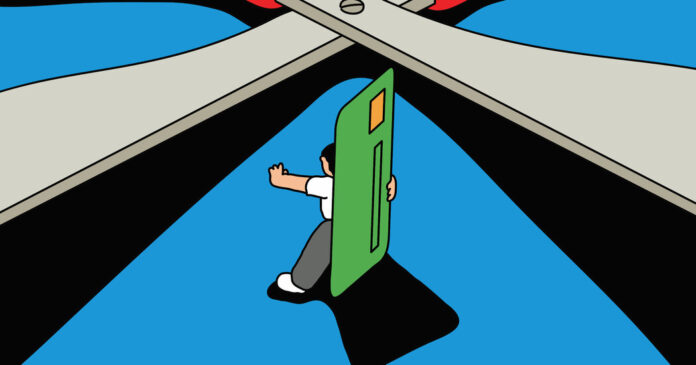Having a checking account is a privilege, not a right, but most people forget about this until they lose access to their accounts.
The security software that banks use to detect criminal activity is slightly frightening. It triggers millions of alerts across the industry every year, and most of them are false.
Still, bank officials heeding the warnings appear to be disconnecting more and more innocent customers from their accounts, The New York Times reported in a series of recent articles. They close checking and credit card accounts in part to get out of the way of regulators concerned about money laundering and other criminal activity.
The closures often come without warning and chaos ensues as people lose access to their money and are unable to pay their bills for weeks.
If you want to prevent something like this from happening to you, it’s helpful to make sure your account activity doesn’t look like that of a criminal.
Many of the tips below come from banking insiders who didn’t want to be named for fear of offending their employers – but spoke anonymously because they’re fed up with their institutions kicking out so many innocent customers. Keep the advice in mind and you may avoid falling into the trap in the future.
The anatomy of a typical checking account
Put yourself in the shoes of your bank’s fraud analysts. Unless it’s a local credit union or community bank with a branch, they have no idea who you are. They often work on a kind of assembly line, where they have to fulfill a daily quota of alerts that need to be addressed. The clues often come directly from the monitoring software that banks use to monitor your transactions.
So how do you make it easy for these people to mark you, the innocent, as someone they shouldn’t mess with?
In a perfect world, your checking account balance looks like the teeth of a saw. A lump sum of income accrues at regular intervals, you spend it over a period of weeks, and then the same amount shows up again and again. Ideally, the money comes via direct deposit from the employer, which bank employees can look up in 10 seconds if they’ve never heard of it.
Many people don’t lead such neat and tidy financial lives, but algorithms have neither sympathy nor empathy. If your life is a bit chaotic, try to keep some pattern to your transactions, especially if you tend to make or receive large payments with different parties or transfer large amounts of money to and from outside accounts.
This also applies if you open a new checking account at all. Often people open an account with a large deposit. While this isn’t necessarily suspicious in and of itself, if another red flag comes up – like the ones in this article, or if you work for a cannabis company, or in some form – the bank may terminate your account within a few days of opening it were arrested. This has happened several times to Times readers, more than 1,000 of whom submitted their stories.
Checks are a warning sign
The number of fraud crimes involving mail and check theft has roughly doubled in recent years. As criminals have focused on checks, banks have put their check fraud algorithms into overdrive.
One way to avoid trouble is to avoid becoming a victim of check fraud in the first place so that the bank doesn’t think you’re suspicious when you later claim money that a thief stole. If you don’t write checks at all – and destroy or hide any checks the bank sends you – fraud becomes less likely.
If you must use checks, do not send them by mail. And if you need to mail a check, try taking it directly to a post office. Home mailboxes and even the post office’s blue collection boxes are more vulnerable to theft as thieves attempt to wash out amounts or recipient names on a particular check and then forward a much larger amount to someone else. And try not to accept checks from people you don’t know in case they try to rip you off.
Avoid suspicious transactions
If you want to think like bankers, consider the types of suspicious activity highlighted by the American Bankers Association in its course for industry professionals.
Many security issues involve cash and its use. For example, a federal law requires bank customers to fill out a form if they deposit or withdraw more than $10,000 in cash. Many depositors don’t know the rule – and don’t like it when a bank employee informs them about it right away.
From the ABA course materials: “A typical example of a suspicious transaction for a teller would be if a customer makes a currency transaction over $10,000, but then reduces the amount of the transaction to under $10,000,” when the bank does so Person about it tells the formal requirement.
Do not do that. Just fill out the form, it won’t hurt you if you don’t break any laws.
Also on the list of no-nos is depositing a lot of cash at ATMs – for example after a shift as a waiter in a restaurant where only cash payments are possible. For you, safety comes first. For the bank, it’s one of many signs that someone could be a drug dealer. Four-digit deposits at different bank branches in a region could raise similar suspicions.
Large cash movements – whether deposits or withdrawals – could also cause problems. Imagine you’re a fraud investigator and you come to work one day and find an alert about a semi-dormant savings account that had a $30,000 deposit into it eight weeks ago. Additionally, three cash withdrawals worth $10,000 each have been made in the last six weeks, one every two weeks.
For you, that might mean selling some stocks to finance the cash purchase of a used car for each of your teenage twins, plus $10,000 to pay a carpenter who doesn’t like checks. For the analyst, the transaction pattern is completely atypical.
Call your bank – and call your bank back
It can be helpful to be both proactive and reactive.
If you’re selling your home and there are six figures in the balance, let your bank know. If you sell your car for cash and put the money in escrow, let your bank know. If your life is about to change – a move, a big change in how and when you make money, a six-month road trip to retirement – let your bank know.
When JPMorgan Chase closed the personal accounts of Bryan Delaney and his wife, as well as another for a bar they owned in New York City, it carefully interviewed new institutions. Chase had cited a pattern of cash deposits as the reason for its concern.
“I told them Chase had a problem with us being a cash company and I wanted to make sure we were in full compliance,” he said. “So I said to them, ‘I’m going to write down how we do, what we do, how and when we make deposits,’ and I gave them old statements so everything was on record.”
Relationships can sometimes help when alarms go off. Fake them with a branch banker when opening an account with a bank with branches and maintain them continuously. “The more you do personally, the better chance you have of at least someone advocating for you,” said Aaron Ansari, a former banking programmer.
If the bank calls you, answer the phone. If you don’t trust it’s really the bank, call the number on the back of your credit or debit card and ask to be put through to the department that supposedly contacted you.
Open email and reply. If the communication seems suspicious, log into your account and send a secure message or call a number on the bank’s website to confirm that the requests are genuine.
Banks must follow so-called “Know Your Customer” rules. And while you may not like it if they suddenly want pay stubs or other information from you, they may show you the door if you don’t comply. Suspicious activity includes “customers who are hesitant to disclose personal information or information about their company,” according to the ABA course on the topic for bank employees.
Any stalemate can result in the bank submitting a so-called suspicious transaction report to the federal government. Too many of these – or even just one – can cause the bank to freeze your accounts.
If it happens to you
When banks close accounts, they generally don’t email, text, or call you. Instead, you’ll receive an old-fashioned letter in the mail. You open your mail every day, right?
If not, there’s a good chance you’ll hear about a closure if your credit or debit card stops working. You call the bank and they will inform you of the closure and the representative – who doesn’t know the exact reasons – will tell you that you can expect to receive your money by check within a few weeks.
If you can’t go weeks without money, your next step might be to go to a branch (if your bank has one) and try to withdraw everything.
Don’t scream when you get there. Making a scene rarely helps your case and may result in the bank calling the police. However, crying could move the needle. If you are still able to get your money, you may also want to empty the locker on site.
Then there’s the approach Elad Nehorai took at a Bank of America branch in Los Angeles in July. He and his wife’s business account was blocked when he reported an attempted fraud to the FBI. According to the bank, accounts are sometimes restricted based on information it receives from law enforcement agencies.
Mr Nehorai went into the branch and was amazed at the reaction of the staff. “There was something very systematic about the whole thing,” he said. “It was clear that it was not their job to know what to do in this situation.”
He and his wife finally decided to just sit around until the bank released the balance from the account. At the same time, he posted about the standoff on Twitter and a local CBS reporter took interest.
After things escalated to this point, Bank of America paid out the funds.
Tara Siegel Bernard contributed reporting.
















